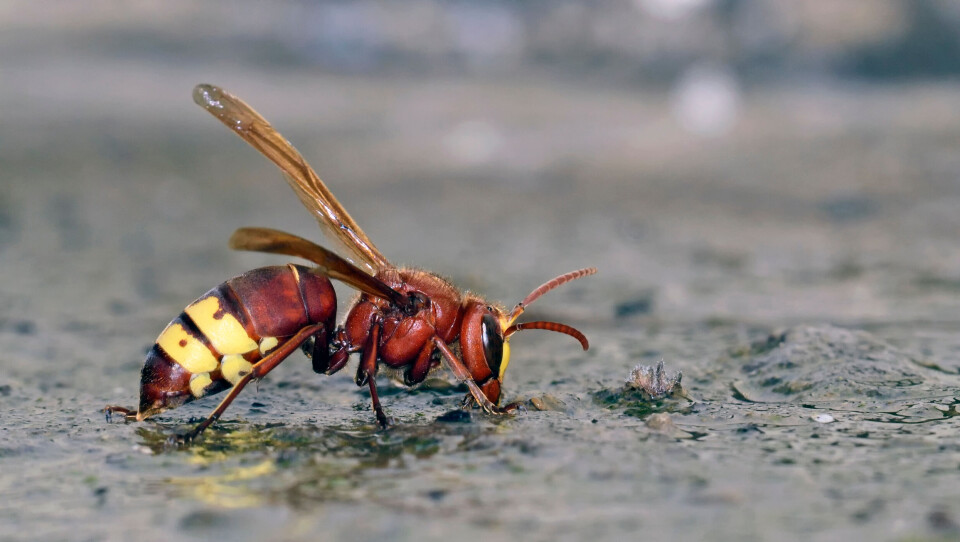-
New Paris-Jersey direct flight to launch this summer
Loganair route forms part of Channel Island’s tourism boost plan
-
Death of right-wing protester in Lyon sparks fears of further political violence
Quentin D, 23, died after reportedly being ambushed by far-left activists near site of political conference
-
Red flood alerts continue in south-west - and more heavy rain expected
Garonne river is particularly affected. French weekly weather forecast February 16 - 20
Bee-eating oriental hornet discovered in Marseille, a first in France
The insect is highly invasive and known to be a ‘formidable predator’ of bees

A species of oriental hornet which preys on domestic bees has been found in Marseille, a first in France.
Researchers from the entomology (the study of insects) laboratory Ecotonia were conducting a routine study into the flora and flora of Marseille when they discovered the insects and have published their finding in the scientific journal Faunitaxys.
The oriental hornet, or the Vespa orientalis Linnaeus, is one of 22 hornet species. It is known to be highly invasive and to feed on bees.
Founder and director of Ecotonia, Gérard Filippi, was one of the researchers who found the insect.
He told FranceInfo: “This species is able to spread very, very quickly. Today it is very difficult if not useless to fight against swarms, because they multiply too fast.”
The researchers found males and females of the species, indicating the presence of a nest that could have existed for some years.
“We don’t know yet,” Mr Filippi said. “The challenge is to find the nest and destroy it as soon as possible.”
Threat to bees in France
The insects’ arrival in France presents a great threat for bees.
As the researchers wrote in their article: “This hornet is considered a formidable predator of domestic bees. We need to verify if it is present in other areas of Marseille or in neighbouring towns and communes.”
It comes as bees in France are already under threat. Each year, populations decrease by 30%, and in the past 10 years 15,000 beekeepers have stopped their work.
A 2016 study from the Environment Ministry found that the extinction of bees would cause a loss of nearly €2.9billion, due to the role that they play as pollinators of farm crops.
Is the oriental hornet dangerous for humans?
Oriental hornet stings can be painful for humans and cause death in the event of an allergic reaction.
However, Mr Filippi said: “Even wasp stings can kill if someone is allergic to them.”
The French health website Ameli.fr states: “The hornet is similar to a wasp but much bigger. It can sting multiple times as, like a wasp, it doesn’t leave its stinger in the skin.”
What to do if you are stung
In the event of a sting, people are advised to call the emergency services if:
-
They are allergic
-
Have been stung multiple times
-
Or have been stung in the mouth or throat and are finding it difficult to breathe.
In this case, sucking on an ice cube can help reduce swelling.
While the oriental hornet is “more aggressive than indigenous species” in France, Mr Filippi said, “it is not a species that attacks, unless it is being attacked. The most important thing is to not approach a swarm”.
How to spot an oriental hornet
The oriental hornet can be recognised by its red colouring with yellow markings on the front of its face and third and fourth sections of its abdomen.
It has a smooth, hairless appearance.
Insect likely to have arrived by boat
Mr Filippi said it was likely that the oriental hornets had arrived in France by boat, as they were found near the Aygalades stream, which leads to Marseille port.
Oriental hornets are present in Bulgaria, Turkey, Cyprus, Malta, northeast Africa, the Middle East, Turkmenistan, Tajikistan, Iran, Uzbekistan, Afghanistan, Pakistan, India and Nepal.
They have also been found in the south of Italy, as well as in Genoa in 2018 and Tuscany in 2021.
They have also been present in Valencia, Spain, since 2012 and in Andalucia.
Related stories
‘No stings yet!’: Feedback from beekeeping beginners in France
Breton beekeeper celebrates as sales of green hornet traps surge
























